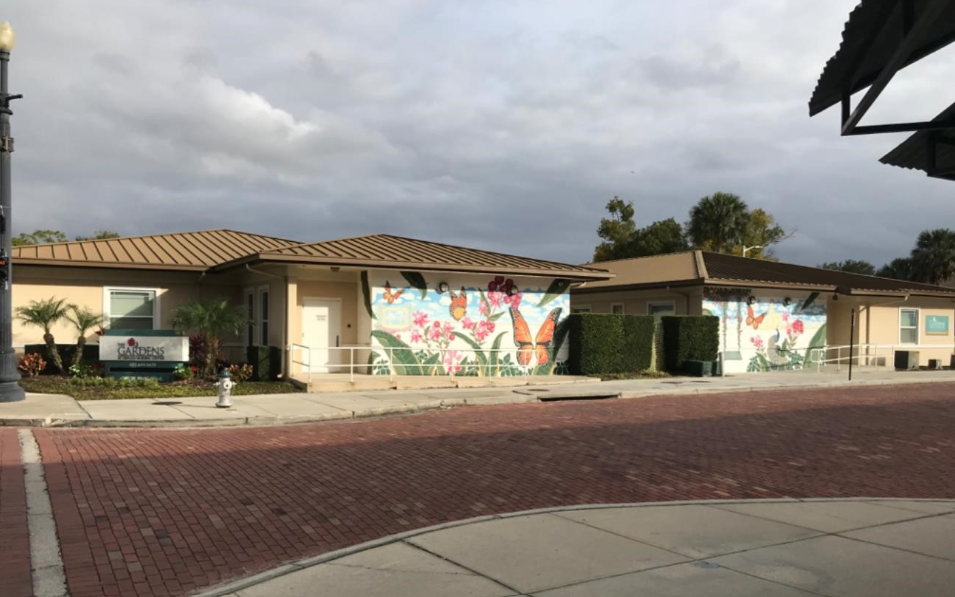
by Beth Kassab | Jan 7, 2026 | City Commission, News, Zoning and Development
Mixed-Use Development Proposed for DePugh Nursing Center Site
The new project by Z Properties will include commercial and residential elements on the prominent corner of Morse and Pennsylvania. The nursing center closed last year.
Jan. 7, 2026
By Beth Kassab
The Gardens at DePugh Nursing Center, which closed in the fall after 70 years, will be demolished and replaced with a “flexible, mixed-use environment offering modular opportunities to purchase space” along with a residential component, according to an announcement on Wednesday by Z Properties.
The Winter Park-based development and design firm led by Zane and Emily Williams said in a news release that the residential portion is still in the early planning. The commercial part of the development will look for a mix of “professional, creative, retail, hospitality and service-oriented businesses, with generous ceiling heights, thoughtfully-designed interiors and flexibility to support a range of uses.”
Zane Williams, who did not immediately respond to an interview request, acknowledged the prominence of the corner at 550 W. Morse Boulevard near Pennsylvania Avenue, and the potential for the new buildings to “set the tone” as visitors enter downtown Winter Park via Morse.
“Our goal here, as always, is to develop with intention and care, and to add beauty to our surroundings,” Williams said in the release. “This is a special corner, and we feel a responsibility to create something locals and visitors will pass by and think, ‘That feels right.’”
The new development will bring further change for the historically Black neighborhood west of Park Avenue that dates back to the city’s founding. The area has undergone significant gentrification over the past 25 years with the redevelopment of Hannibal Square and a number of larger homes replacing small, single-story houses.
The DePugh center opened in 1956 as the first state-approved nursing home where aging Black residents could seek care during segregation. The center was named for Mary Lee DePugh, who moved to Winter Park in 1937 to work for a white family she knew from the Chicago area and began advocating to provide health care to those in need as part of her work with the Ideal Woman’s Club, which she founded on the west side of the city. She died before the center opened.
Leaders of the Center decided to close it because of rising operating costs.
Z Properties applied for a demolition permit in October, said city Planning & Zoning Director Allison McGillis. The permit is likely to be approved because the building is not historically designated.
A representative of the firm said renderings of the proposed project will be available in the coming months.
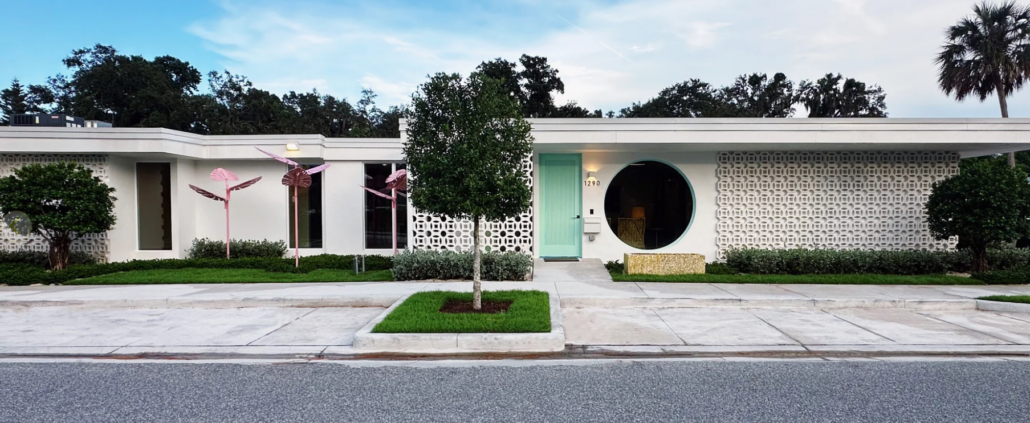
A portion of the Palmetto Grove work spaces by Z Properties near Seven Oaks Park. The project, which refurbished older buildings, recently won praise from City Commission members. (Photo courtesy of Z Properties)
Williams said in the release that one unique aspect of the plan will be the option for business owners to also own a physical space.
“There are so many business owners who dream of designing and owning their own building in the same way people dream of building their homes,” he said. “Ownership allows you to establish permanence, identity, and control of your space — this project is about making that a reality.”
Z Properties is partnering with Stream Realty on the development.
“It’s exceptionally rare to come across the opportunity to own custom-designed commercial space in Winter Park,” Darryl Hoffman, executive vice president at Stream Realty, said in the news release. “We’re thrilled to partner with Zane on this first-of-its-kind development for the area.”
Z Properties recently received praise from the City Commission related to its makeover of workspaces near Seven Oaks Park known as Palmetto Grove along Palmetto Avenue. The buildings were refurbished to have an elevated, high-end look not far off of Orange Avenue where the city is working to improve one of its gateways.
The release said the team is aiming for completion of the project on the DePugh site in 2027 and will unveil its name and more details in the near future.
WinterParkVoiceEditor@gmail.com
To comment or read comments from others, click here →

by Beth Kassab | Dec 12, 2025 | City Commission, News, Uncategorized, Zoning and Development
Via Tuscany Homeowner Owes More Than $300k in Code Fines
Construction on the house began in 2018 and just concluded this year, prompting repeated complaints by neighbors
Dec. 12 , 2025
By Beth Kassab
The owner of an ultra modern mansion on the corner of Via Tuscany and Howell Branch Road owes more than $331,000 in code enforcement fines after the City Commission refused the man’s request to eliminate the fines he accumulated during nearly seven years of construction.
Fernando Bermudez, the owner of the home through Casselberry-based Developer and Builder Group LLC, told city officials in a letter dated Sept. 5, 2025 that the drawn-out construction timeline was the result of complications brought on by COVID-19, which killed one of his partners, and Hurricane Ian, which struck in September of 2022.
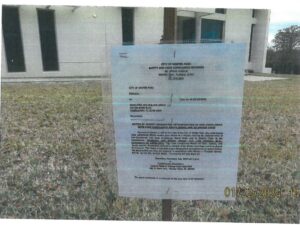
A snapshot included with Winter Park code enforcement documents shows a notice of violation posted in front of the home.
But the construction process at 2661 Via Tuscany started long before those events when the first permit was granted by the city in September of 2018. The certificate of occupancy for the 4-bedroom, 4,500-square-foot house was finally issued in July of this year.
Bermudez, who attended the City Commission meeting on Wednesday, said through his attorney that he was unaware of the fines and blamed a number of problems on his contractors, which changed repeatedly during the project.
But Gary Hiatt, building and permitting director, showed commissioners minutes from a Code Enforcement Board hearing in November of 2022 that showed Bermudez was in attendance and spoke along with a contractor about the timeline of the project. At that meeting, the board ordered that fines of $250 a day per violation would begin accumulating if the house wasn’t completed in 60 days, according to records.
“There were multiple times where they gave us, ‘We’ll be done by here or we’ll be done by here,’ and it just never came to fruition,” Hiatt said.
Violations, which included allowing permits to expire without completing the project and failing to meet deadlines, went on in at least one case for more than 900 days and, in another, more than 300.
“The incomplete vacant structure remains a public nuisance,” the code board concluded in a March 23, 2023 order that said fines would continue and the city would place a lien on the property.
In his letter to city officials to request the fines and lien be eliminated, Bermudez claimed ignorance about the existence of the fines and detailed how construction materials ordered from Europe were delayed by the pandemic as well as how the project was impeded by his own illness and the loss of his partner to the virus.
A Realtor.com listing for the property, which is now up for sale for $6.6 million (more than $1,400 per square foot), boasts of two primary suites (one on each floor), lighting fixtures from Greece, Italian porcelain flooring and “unparalleled craftsmanship, high-end finishes, and an open-concept layout for those who appreciate architectural brilliance and luxury living.”
The house, “follows commercial-grade construction standards, making it a bunker-style fortress unlike any other,” according to the listing.
But Bermudez wrote that the amount of the fine is “a debt impossible for us to pay.”
He said “the real estate market is now extremely slow” and he faces potential foreclosure by a private lender.
But commissioners said they didn’t hear any good reasons to reduce or eliminate the fines.
“These are legitimate fines in my opinion,” Commissioner Craig Russell said, noting that Bermudez’s company had developed other houses so should have had some familiarity with the process.
Russell and Commissioner Warren Lindsey also noted how the lengthy construction process affected the neighborhood.
Neighbors complained to the city about the project repeatedly, citing the unfinished work, debris and other violations.
“Overall, the process has been unprofessional (single workers showing up after hours or on weekends as if the whole project is some sort of shady after thought), unnecessarily drawn out and damaging to our property,” one neighbor wrote the city.
WinterParkVoiceEditor@gmail.com
To comment or read comments from others, click here →
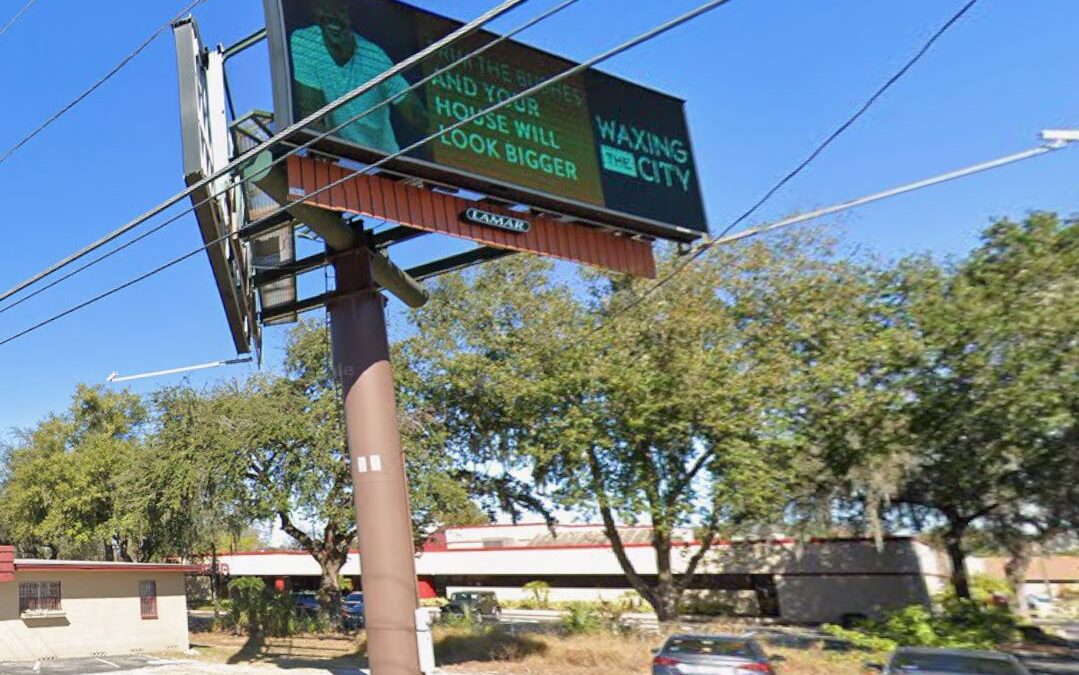
by Beth Kassab | Dec 11, 2025 | City Commission, News, Zoning and Development
Up to Eight Billboards in Winter Park to be Removed
The concept of a deal approved by the City Commission calls for four new billboards along I-4 while eight billboards along surface roads come down
Dec. 11, 2025
By Beth Kassab
For years, Winter Park officials have wanted to rid the city of billboards — considered by some to be analog roadside spam — and this week brought the first step in taking down as many as two billboards on Fairbanks Avenue, four of the structures on Aloma Avenue, one on Lee Road and one on Interstate 4.
City commissioners voted 5-0 to approve the concept of a deal that will require a series of land swaps and annexations and the permitting of four new billboards along I-4 in exchange for the eight other signs coming own.
“We’ve been working for many, many many years to try to eliminate as many billboards in the core of the city,” City Manager Randy Knight told the commission.
The terms call for:
- Clear Channel Outdoor will remove two billboards at 1873 and 2095 Fairbanks Avenue and one at 2522 Aloma Avenue. All three of those signs are double-sided. In exchange, Winter Park will issue a permit for Clear Channel to construct a new billboard at 2600 W. Fairbanks with a digital sign facing westbound I-4 traffic and a static sign facing eastbound traffic. Clear Channel would also remove a three-sided billboard at the southeast corner of I-4 and Lee Road. It would be replaced by a new billboard about 300 feet to the south, which will require a property swap with the city. The property swap could come before the commission as early as January.
- The Lamar Company will remove a digital billboard at 1621 Lee Road and the city will permit a new digital billboard at 909 N. Wymore Road. This means the city will also need to annex a portion of land for the structure.
- Outfront Media will remove three billboards at 2090, 2145 and 2431 Aloma Avenue. The city will issue a permit for a new digital billboard at 1885 Dartmouth Avenue. The city must annex several properties on Dartmouth to make that portion of the deal happen.
Mayor Sheila DeCiccio asked if Clear Channel could also remove a billboard on U.S. 17-92 and Gay Road. The company would not agree to remove it but said it would replace the digital side of that billboard with a newer technology that creates less light pollution.
“We definitely want that,” DeCiccio said of the upgraded features.
WinterParkVoiceEditor@gmail.com
To comment or read comments from others, click here →
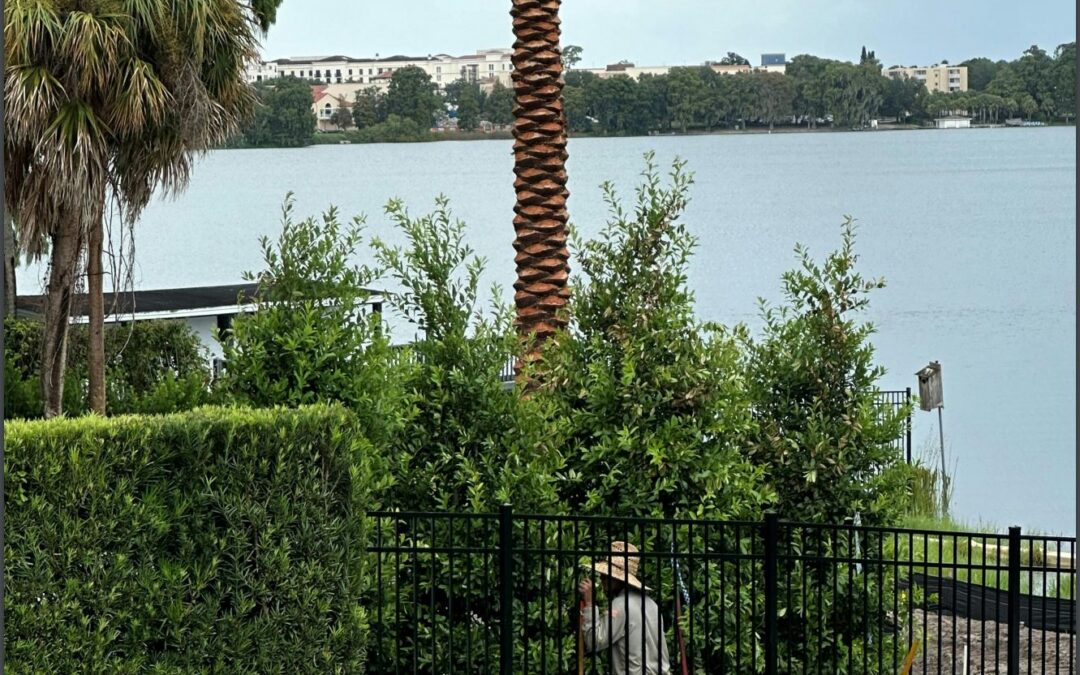
by Beth Kassab | Nov 12, 2025 | City Commission, News, Zoning and Development
Backyard Palm Trees on Lake Spark a Pricey Legal Battle in Winter Park
A homeowner is suing the city over a decision that the height of his landscaping must be limited to help maintain the lake view of his neighbors
Nov. 12, 2025
By Gabrielle Russon
A fight over two palm trees has cost the city of Winter Park nearly $29,000 in legal fees so far.
Jonathan Cole, the owner of a newly constructed 5,300-square-foot home at 721 Virginia Dr., filed a legal challenge to keep a pair of backyard palm trees that his neighbors say impede their view of Lake Virginia.
Cole is asking Orange Circuit Court to overturn a decision by the city — and a construction condition Cole originally agreed to — that limits landscaping behind his house to less than six feet in height.
Winter Park spokeswoman Clarissa Howard said in a statement, “The case has been fully briefed and is in the hands of the three-judge panel for a ruling. We have been given no indication as to when that ruling might be issued.” She said no settlement talks are currently underway.
Cole’s attorneys did not respond to a request for comment for this story.
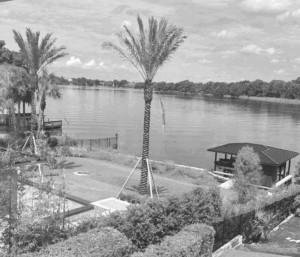
A photo of Cole’s backyard included in the court file shows the palm trees in question.
Cole argued he should be allowed to keep his trees since his interpretation of the Planning & Zoning Board’s decision is that the height limit doesn’t apply to his entire backyard, only the property line.
“This is a case of local government overreach and cries out for reversal,” he said in his February court petition. “Almost every single home on Lake Virginia has either very large trees on or near its property line running down to the lake or very large privacy hedges — and this includes the eastern neighbor who’s the one that complained about this.”
The tall, skinny palm trees don’t ruin anyone’s view, Cole’s legal team said when the issue went before the Winter Park City Commission in January. But several city officials said they were concerned about setting a precedent to allow the palm trees and unanimously voted to uphold the P&Z Board’s 2021 decision. Cole then filed a circuit court challenge.
Winter Park officials said the six-foot limit is reasonable to protect his neighbors, and Cole had been given more than his fair due process.
With the approval of P&Z, Cole “got everything that he asked for (all the square footage, construction closer to the lake, all the coverage of property, etc.) but was merely required to be considerate of his neighbors by restricting the height of the landscaping behind his home to no more than six feet,” the city said in an August court filing in response to Cole’s complaint, which is part of the hundreds of pages of court records.
The city also pointed out that Cole and his attorney both agreed to the six-foot requirement at the time in 2021. Cole missed the 30-day window to challenge the P&Z decision.
Construction was delayed on Cole’s house, and the lakefront landscaping was finally installed last year. That’s when his neighbor alerted the city about the two palm trees and overgrown holly shrubs.
Cole maintained he was in compliance, while the city called the plantings a violation of the original agreement.
Both Cole and his neighbors made emotional arguments to the City Commission earlier this year.
Neighbor Michelle Randolph said Cole already received special permission to build his home and now he wanted more.
“He was granted a major privilege to be able to build a house of this size and to be able to shift the house against the code … towards the lake,” Randolph told commissioners in January, according to court records. “This is what we were given as residents — just the common courtesy of please don’t plant anything over six feet. Like, you’re getting the house you want. You get to move it towards the lake. Please don’t plant anything over six feet.”
She insisted the palm trees did affect her lake view — even more so because of the house’s ultimate location.
Cole said he was exhausted by the construction process and has worked to satisfy his neighbors.
“Clearly I’m being painted as this guy that’s built a privileged monstrosity,” he told city leaders. “I’ve tried to be neighborly. I’ve tried to have discussions.”
When construction started, his daughter was 12; now she is 16, he said. Cole bought the vacant lot in 2020 for $2.1 million, according to Orange County Property Appraiser records. The property’s value was assessed at about $3.8 million this year.
“I’m sick of dealing with the stress of building a house,” Cole said. “At this stage, I want to be done with it. I don’t have time to fight this forever. I’m shocked that I’m here talking about palm trees.”
WinterParkVoiceEditor@gmail.com
To comment or read comments from others, click here →
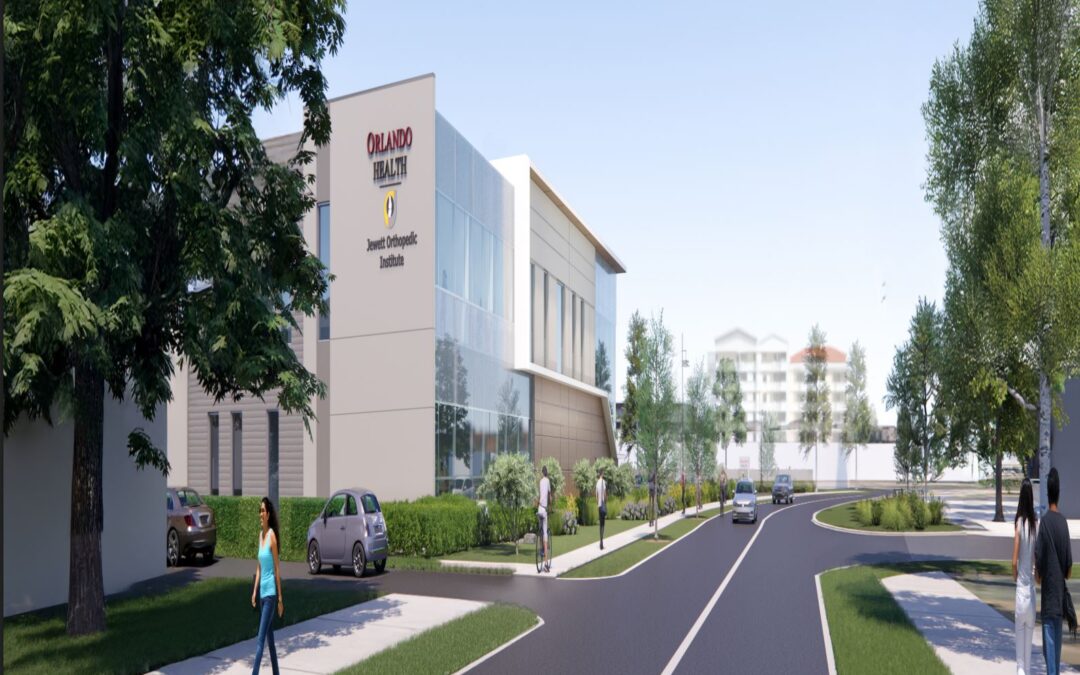
by Beth Kassab | Oct 23, 2025 | City Commission, News, Zoning and Development
New Racquet Club Building Approved With Even More Conditions
Also approved: New Jewett Ortho Building and a Raise for the City Manager
Oct. 23, 2025
By Beth Kassab
The Winter Park Racquet Club won approval for a new building in the residential enclave off Lake Maitland known as the Vias after a contentious debate with neighbors that included a final-hour meeting before Wednesday’s vote that led to additional conditions imposed on the 72-year-old private club.
Commissioners voted 4-1 to allow the demolition of a two-story house on Via Tuscany and construction of a new single-story fitness center, tennis shop and offices with 12 new conditions on top of the nine rules recommended by the Planning & Zoning Board. Commissioner Warren Lindsey, who said he was a former member of the club, was the only dissenting vote.
The sentiment of the people who live in the neighborhood was mixed with several residents who live closest to the club still urging commissioners to vote against the project.
Dr. Scott Greenberg, a recently retired plastic surgeon who lives directly across the street from the club, said he was part of the meeting that resulted in the new conditions.
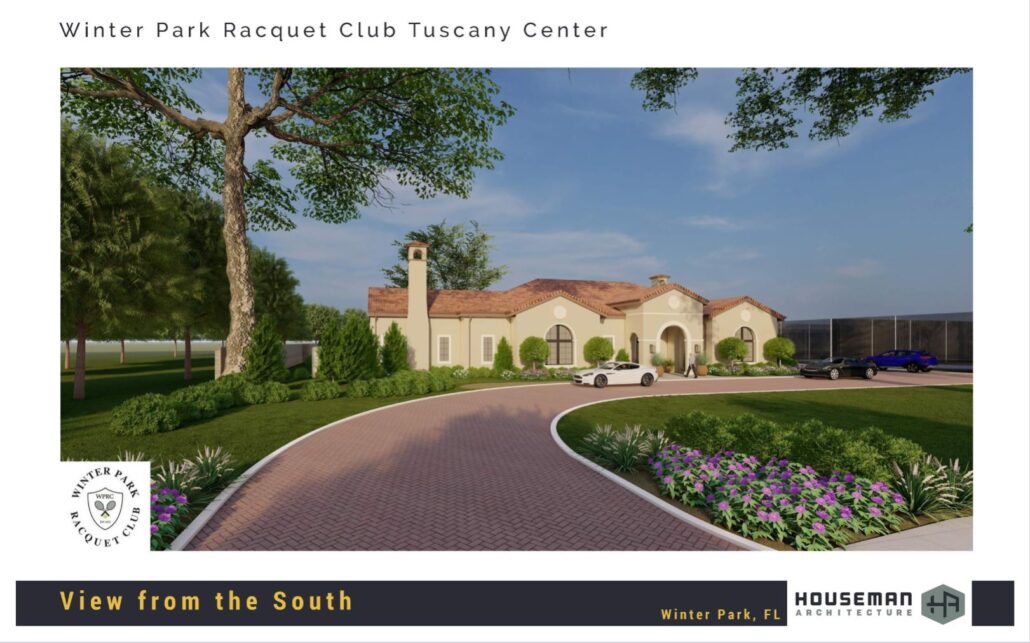
“We felt we had to agree to them because we didn’t have a choice,” said Greenberg, who asked commissioners to cast a “no” vote and said there was a “culture of mistrust” because he was led to believe the home at 2011 Via Tuscany would be left as it when the club purchased it in 2015.
Marci Greenberg told the Voice that the club was hardly noticeable when she and her husband moved to their home, but has since grown significantly with more traffic, noise and lights from the tennis and pickleball courts.
Hillary Turner, who lives nearby and whose mother lives directly next to the club, echoed that point in front of the commission on Wednesday.
“When we moved to this property in 1980 most of the hosuess didn’t have pools,” she said. “They didn’t need them because everyone swam at the racquet club. The racquet club, at that time, was a neighborhood club. It has now transformed into a club within a neighborhood.”
She said the club’s size over the years has more than doubled to 500 members and many don’t live in the neighborhood.
Clay Coward is a member of the club who lives less than a mile away and said he supported the club’s plans and noted the number of times smaller homes in the area have been torn down and replaced by large “mansions.”
He showed the commission several photos of homes along Via Tuscany, including one he called “Hotel California” because he said it’s reminiscent of the Eagles album cover. The house is about 9,000 square feet, has eight bathrooms and what appears to be a six-car garage — not unusual attributes for the lakefront neighborhood of multi-million dollar homes.
Coward suggested the club’s redo of the house at 2011 Via Tuscany into a 6,300-square-foot mediterranean style building would fit right in.
Rob Carter, one of the club officers who has led the project, said he has tried to work and collaborate with the neighbors.
“This has been a long road,” he said, noting that the club has “readily agreed” to multiple conditions.
He said the current house could not be renovated because its age, old windows, low ceilings and a pool in the backyard the club would not want to use made it cost prohibitive.
The new building he said will provide not only a new small gym and locker rooms for members but, for the first time, a separate area for staff to eat meals and staff restrooms.
“Right now there’s no break room or segregated bathrooms,” he said.
The club agreed to following new conditions on top of the nine already set by Planning & Zoning.
- Keep or replace the existing podocarpus hedge at the front of the property and added additional hedges to fill in the property line.
- Cars cannot be parked in the circular driveway off Via Tuscany except for special events, which will be limited to five cars.
- No parking can occur on the lot before construction begins.
- The club can not host large events for non-members unless it’s member-sponsored.
- The size of events must be capped to eliminate the need for on-street parking.
- Must plant podocarpus hedge on the northern property line adjacent to the home at 2175 Via Tuscany.
- Must add glare shields to the lights on the pickleball courts.
- Must turn off lights on tennis and pickleball courts when not in use.
- Must cap membership at the current 500 members.
- Eliminate existing ads for event space online or in print publications.
- Must allow the podocarpus hedge in front of the pickleball courts to grow to the height of the fence surrounding the courts.
- Compliance with the conditions will be monitored with the typical code compliance procedures.
During the commission meeting the additional conditions were added: there must be blinds or curtains on the new gym window facing Via Tuscany, the club must establish a neighborhood relations committee and the club can not add signs to the front of the building (which it wasn’t proposing to do).
New Jewett Building for Orlando Health
Orlando Health won approval on Wednesday to build a new Jewett Orthopedic Institute on Gay Road and Trovillion Avenue not far off U.S. 17-92 across from Winter Park Village.
The 27,000-square-foot, two-story building will combine five lots that are mostly vacant today and will replace the longtime Jewett offices 1285 Orange Avenue.
Jewett became part of the Orlando Health hospital system in 2020 and also has a large office in downtown Orlando near the hospital’s main campus.
In 2019, the commission approved an office development for the property, but the development never happened. That approved plan included a 6-foot masonry perimeter wall and lush landscape to buffer the development next to the Chateaux du lac and
Killarney Bay condominiums.
The new conditions call for a perimeter fence and a perimeter hedge along those property lines.
Raise for City Manager
The board also approved a 3% merit raise for City Manager Randy Knight and thanked him for his longtime dedication to the job.
Knight, who has worked for the city for more than 30 years and as city manager for 18 years, earns $274,393. He plans to retire in 2027.
WinterParkVoiceEditor@gmail.com
To comment or read comments from others, click here →
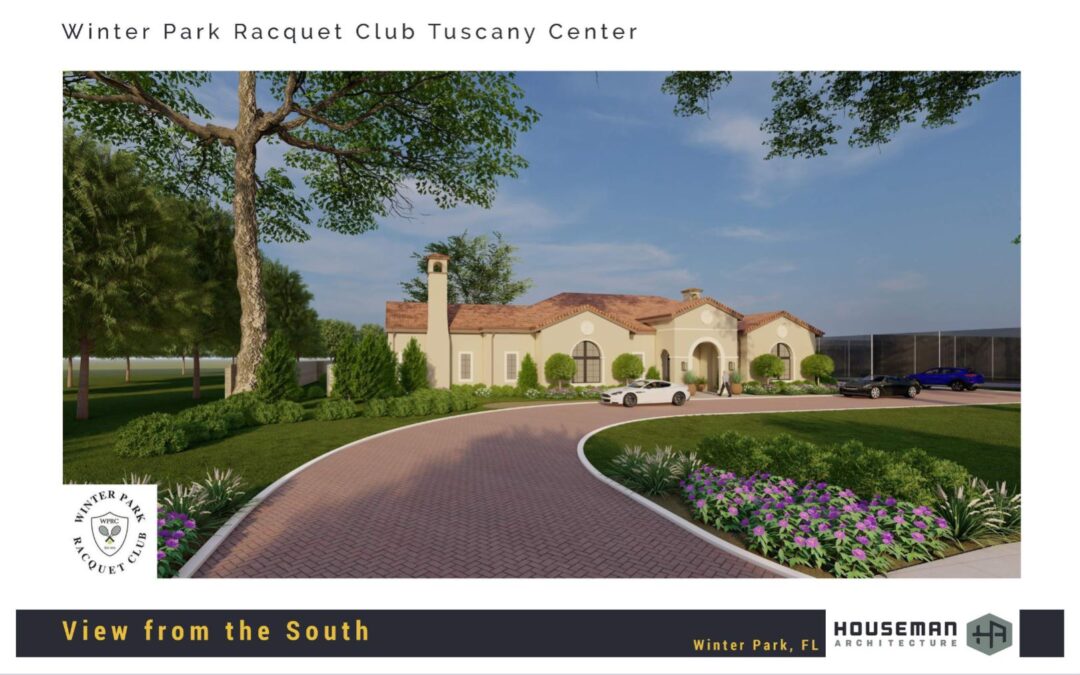
by Beth Kassab | Oct 20, 2025 | City Commission, News, Zoning and Development
Commission to Consider Racquet Club Expansion This Week
Also up for consideration is the city manager’s evaluation and salary
Oct. 20, 2025
By Beth Kassab
A controversial expansion planned by the exclusive Winter Park Racquet Club will look to the City Commission this week for final approval.
Some residents in the neighborhood known as “the Vias,” a posh enclave between the shores of Lake Maitland and Temple Drive, oppose the changes at the club, which they say already lights up their quiet street like a “Walmart” or “McDonald’s” at night with pickleball courts, tennis courts and events.
The meeting on Wednesday is likely to feature debate on the plans, with call for the white-columned two-story home at 2111 Via Tuscany to be torn down and replaced with a larger one-story building to house a new fitness center, locker rooms, tennis shop and offices for the club. The proposal was approved earlier this month by the Planning & Zoning Board in a 5-1 vote.
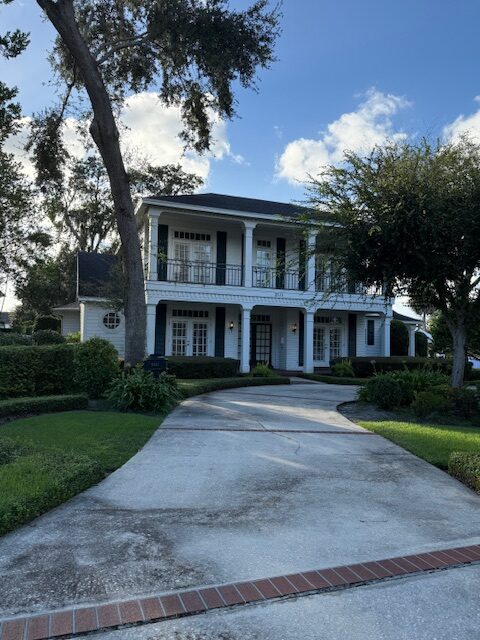
This home on Via Tuscany will be demolished if the Racquet Club’s plans are approved to make way for the proposed building pictured above.
Conditions of the approval by P&Z include the following, according to the staff report:
- The driveway on Via Tuscany will be an entrance-only access point.
- WPRC can not increase its membership.
- Hours of operation of the new building will be limited to 7 a.m. to 8 p.m. daily,
including deliveries.
- No new lighting will be provided in the grass parking lot behind the new building.
- All non-required lights for safety purposes be shut off by 10:00 p.m. daily.
- As part of the tree removal permit for the 25 and 27-inch oaks, double the required
compensation shall be required, at four six-inch canopy trees, subject to Urban Forestry
approval and be planted at least 15-feet from the southern property line
wall or fence.
- Narrow the proposed driveway to 12 feet at the entrance on Via Tuscany and
the exit onto Tom Gurney Drive. The width of the middle portion of the driveway may be a maximum of 14 feet.
- Conduct a comprehensive photometric analysis of the entire WPRC campus to confirm that all lighting is fully shielded at the property boundaries and implement any necessary measures to eliminate light spillover onto adjacent properties.
- Shut off all pickleball lights by 8 p.m., instead of the current cutoff of 9 p.m., daily.
The City Commission has the ability to accept, reject or change any of the conditions when it meets on Wednesday.
Raise for City Manager?
The Commission on Wednesday will also take up its annual evaluation of City Manager Randy Knight, who oversees the day-to-day operations of the city and its 500 employees.
Knight, who has worked for the city for more than 30 years and as city manager for 18 years, earns $274,393 and is eligible for up to a 3% merit increase.
Commissioners gave him an average rating of 3.8 on 4-point scale of leadership and performance metrics, according to city documents.
On a list of other cities with a city manager form of government provided to commissioners, Knight was the highest earner in Central Florida with the exception of the Villages, which isn’t actually a city but a collection of unincorporated retirement communities with more than 80,000 residents. It pays its district manager $324,000, according to the document.
The city of Winter Park has about 30,000 residents.
Several South Florida cities on the list such as Miami Beach (pays $298,000 with 83,000 people), Naples (pays $325,000 with 20,000 people), Cape Coral (pays $330,000 with 223,000 people) and Ft. Lauderdale (pays $350,000 with 190,000 people) also boasted higher salaries.
Knight has said he plans to retire in early 2027.
WinterParkVoiceEditor@gmail.com
To comment or read comments from others, click here →












Recent Comments